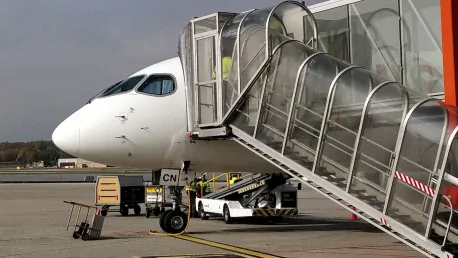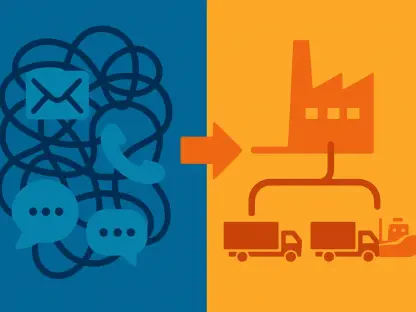The air cargo industry is currently grappling with persistent challenges brought about by stringent regulations and an ever-changing global trade environment. Traditional compliance mechanisms that heavily depend on paper-based processes and fragmented systems are proving to be inadequate. This article delves into how Regulatory Technology (RegTech) is emerging as a transformative force and is poised to redefine the compliance landscape within the air cargo sector.
The Need for Change
Transformative Impact of Emerging Technologies
Technological advancements such as Artificial Intelligence (AI) and Blockchain are significantly impacting the air cargo industry. These emerging technologies offer new opportunities for enhanced interoperability and efficiency. For example, initiatives like the International Air Transport Association’s (IATA) ONE Record are setting new standards for data sharing within the logistics sector. This standard promotes collaboration by providing a single data-sharing platform that increases visibility and reduces the complexities associated with traditional compliance procedures.
The implementation of AI and Blockchain in the air cargo industry is ushering in an era of digitization that promises substantial benefits. AI algorithms can efficiently handle vast amounts of data to identify patterns and anomalies, significantly improving risk assessments and decision-making processes. Meanwhile, Blockchain technology ensures the immutability and security of data, which is crucial for maintaining the integrity of transactions and documentation. Together, these technologies are laying a robust foundation for a more resilient and transparent air cargo compliance framework.
Challenges with Traditional Compliance Systems
Traditional compliance systems are struggling under the weight of increasingly complex regulations and dynamic global trade dynamics. These systems largely rely on manual processes and siloed data management, leading to inefficiencies and frequent errors. The limitations of paper-based processes make scaling compliance efforts close to impossible and compromise the overall effectiveness of compliance initiatives across the industry. Manual data entry and document verification often result in delays, increasing the risk of non-compliance and associated penalties.
Moreover, the fragmented nature of traditional compliance mechanisms makes it challenging to maintain a cohesive and streamlined approach. In an industry where compliance is critical for operational success, reliance on outdated methods is unsustainable. These challenges have highlighted the urgent need for innovative solutions that can effectively address the evolving compliance requirements and ensure operational efficiency. The industry must embrace technology-driven solutions to meet these demands and create a more agile compliance environment.
The Rise of RegTech
The Promise of RegTech
Regulatory Technology, or RegTech, promises to transform traditional compliance processes by automating and streamlining various tasks. RegTech solutions provide real-time risk assessments and enable proactive decision-making, considerably reducing the time and resources required for compliance operations. By leveraging advanced technologies, RegTech helps organizations achieve faster processing times, reduce errors, enhance transparency, and lower operational costs.
The capability of RegTech to provide real-time insights allows compliance officers to identify and address potential risks before they escalate. Automation tools can manage repetitive tasks, such as document validation and data entry, thereby enhancing the accuracy and consistency of compliance efforts. Additionally, the integration of RegTech solutions reduces the reliance on manual interventions, resulting in fewer operational bottlenecks and improved overall efficiency. As a result, the integration of RegTech into existing compliance frameworks represents a significant step forward in addressing the industry’s challenges.
Key Applications of RegTech
Export Controls
One of the crucial areas where RegTech is making a substantial impact is in export controls. AI-powered tools are now capable of automating the classification of goods under various export control lists. This not only ensures compliance with export regulations but also accelerates the classification process, making it more efficient and accurate. By automating these tasks, companies can significantly reduce the risk of errors and ensure timely compliance with international trade laws.
In addition to AI, other advanced technologies are being employed to validate and cross-reference export data in real-time. This includes automatically updating regulatory changes and ensuring that all export-related activities comply with the latest requirements. Such automation facilitates quicker decision-making and minimizes the risk of penalties for non-compliance. These advancements highlight the critical role of RegTech in enhancing the accuracy and speed of compliance processes within the air cargo industry.
Customs and Declarations
RegTech solutions are revolutionizing how customs and declarations are handled, offering advanced technology frameworks that validate Harmonized System (HS) codes and auto-fill required data fields. These innovations expedite the customs clearance process, significantly reducing the time needed for manual data entry and verification. Automated validation ensures that all documentation is accurate and complete, thereby minimizing the likelihood of delays caused by errors or omissions.
Moreover, RegTech tools provide seamless integration with customs authorities, enabling real-time updates and improved communication. This connectivity allows for immediate notification of any discrepancies or issues, facilitating prompt resolution. By automating customs and declarations processes, RegTech enhances the overall efficiency and reliability of air cargo operations, ensuring that compliance is maintained without compromising speed or accuracy.
Cargo Security
Securing cargo throughout its journey is a critical aspect of compliance in the air cargo industry. Advanced technologies employed by RegTech improve chain-of-custody documentation and management for security programs such as the European Union’s Air Cargo or Mail Carrier operating into the Union from a Third Country Airport (EU ACC3) and the U.S. Transportation Security Administration’s (TSA) Known Shipper Program. These technologies enable organizations to track and verify the integrity of cargo at each stage of transit, effectively reducing compliance risks.
RegTech solutions offer tools for real-time monitoring and documentation of security measures, ensuring that all protocols are adhered to consistently. This includes automated alerts for any deviations or potential security breaches, allowing for immediate corrective action. By enhancing the transparency and accountability of security processes, RegTech plays a pivotal role in mitigating risks and ensuring that cargo is secure from origin to destination.
Integrating Advanced Technologies
Integration with AI and Blockchain
Blockchain
Blockchain technology is rapidly gaining recognition for its potential to provide immutable records essential for real-time validation and compliance tracking. In the air cargo industry, Blockchain can ensure that all transactions and documentation remain tamper-proof, which is vital for maintaining compliance. While still in the early stages of wide-scale adoption, Blockchain holds immense promise for enhancing transparency and trust within the industry.
For example, Blockchain can facilitate the creation of decentralized ledgers that record every transaction involving cargo shipments. This not only allows for real-time tracking and verification but also ensures that any unauthorized alterations are immediately detected. The security and traceability offered by Blockchain can significantly reduce the risk of fraud and errors, thereby strengthening overall compliance efforts. As the technology matures, its deployment in the air cargo sector is expected to increase, paving the way for more secure and efficient operations.
Predictive Analytics
Predictive analytics, powered by AI, is another game-changer for the air cargo industry. These tools analyze historical and real-time data to forecast potential regulatory issues and mitigate risks before they materialize. By leveraging vast datasets, predictive analytics can identify trends and patterns that may indicate emerging compliance challenges. This proactive approach enables organizations to address issues at an early stage, thereby minimizing the impact on operations.
The application of predictive analytics extends beyond just risk identification. These tools can also optimize various aspects of the compliance process, such as resource allocation and workflow management, by providing data-driven insights. Such capabilities allow for more informed decision-making and strategic planning, ultimately enhancing the efficiency and effectiveness of compliance measures. As AI continues to advance, the predictive power of analytics will become even more integral to the air cargo industry’s compliance strategies.
The Role of IoT
The Internet of Things (IoT) is revolutionizing real-time monitoring capabilities in the air cargo industry. IoT devices, embedded with sensors, continuously monitor critical conditions such as temperature, location, humidity, and shock data. These sensors provide constant feedback, allowing for precise tracking of cargo conditions and ensuring proactive compliance with industry regulations.
The data generated by IoT sensors can be integrated into RegTech solutions, offering comprehensive insights into the status of shipments. For instance, temperature-sensitive goods can be monitored to ensure they remain within required parameters throughout transit. Any deviations trigger immediate alerts, enabling corrective action before the goods are compromised. This real-time monitoring and alert system not only enhances compliance but also protects the integrity and quality of the cargo being transported.
Furthermore, the integration of IoT with RegTech extends beyond just monitoring. IoT data can be used to provide detailed reports required for compliance documentation, streamlining the audit and verification process. This creates a more efficient and accurate documentation workflow, reducing the burden on compliance teams and ensuring that all regulatory requirements are met with precision. As IoT technology continues to evolve, its applications within RegTech frameworks are expected to expand, offering even greater benefits for the air cargo industry.
Looking Ahead to 2030
Future Outlook
As the air cargo industry looks towards 2030, the role of compliance functions is expected to evolve significantly. The shift from automation-as-support to automation-as-intelligence will be driven by AI-driven solutions that ensure real-time compliance monitoring and enable proactive decision-making. These intelligent automation technologies will dominate compliance operations, transforming how organizations manage regulatory requirements.
By incorporating AI-driven solutions, air cargo companies can achieve a higher level of operational efficiency and accuracy in compliance processes. Real-time compliance monitoring will become standard practice, allowing organizations to identify and address potential issues instantly. Proactive decision-making, supported by intelligent automation, will enable a seamless integration of compliance measures into routine operations, reducing the risk of non-compliance and associated penalties. This evolution reflects the industry’s ongoing commitment to leveraging advanced technologies for enhanced regulatory adherence.
Strategic Recommendations for Stakeholders
The air cargo industry is facing ongoing challenges due to strict regulations and a constantly changing global trade landscape. Traditional compliance methods, which largely rely on paper-based systems and fragmented processes, are proving to be inadequate in this dynamic environment. This article explores how Regulatory Technology, commonly known as RegTech, is becoming a game-changer. RegTech uses advanced technologies such as artificial intelligence, blockchain, and data analytics to streamline and automate compliance tasks. By replacing outdated practices, RegTech offers solutions that are more efficient, accurate, and adaptable to the complexities of today’s global trade. The integration of these technological advancements into the air cargo sector is expected to redefine how compliance is managed, making it more resilient to evolving regulatory demands and market conditions. As a transformative force, RegTech not only simplifies compliance but also enhances overall operational efficiency, positioning the air cargo industry for future success.









